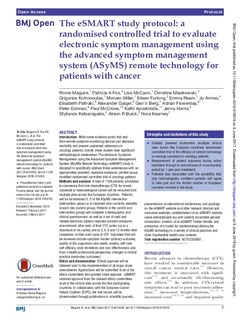The eSMART study protocol: a randomised controlled trial to evaluate electronic symptom management using the advanced symptom management system (ASyMS) remote technology for patients with cancer
Maguire, Roma; Fox, Patricia A.; McCann, Lisa; Miaskowski, Christine; Kotronoulas, Grigorios; Miller, Morven; Furlong, Eileen; Ream, Emma; Armes, Jo; Patiraki, Elisabeth; Gaiger, Alexander; Berg, Geir Vegard; Flowerday, Adrian; Donnan, Peter; McCrone, Paul; Apostolidis, Kathi; Harris, Jenny; Katsaragakis, Stylianos; Buick, Alison R.; Kearney, Nora
Journal article, Peer reviewed
Published version
Permanent lenke
http://hdl.handle.net/11250/2500570Utgivelsesdato
2017Metadata
Vis full innførselSamlinger
Sammendrag
Abstract Introduction While some evidence exists that real-time remote symptom monitoring devices can decrease morbidity and prevent unplanned admissions in oncology patients, overall, these studies have significant methodological weaknesses. The electronic Symptom Management using the Advanced Symptom Management System (ASyMS) Remote Technology (eSMART) study is designed to specifically address these weaknesses with an appropriately powered, repeated-measures, parallel-group stratified randomised controlled trial of oncology patients. Methods and analysis A total of 1108 patients scheduled to commence first-line chemotherapy (CTX) for breast, colorectal or haematological cancer will be recruited from multiple sites across five European countries. Patients will be randomised (1:1) to the ASyMS intervention (intervention group) or to standard care currently available at each site (control group). Patients in the control and intervention groups will complete a demographic and clinical questionnaire, as well as a set of valid and reliable electronic patient-reported outcome measures at enrolment, after each of their CTX cycles (up to a maximum of six cycles) and at 3, 6, 9 and 12 months after completion of their sixth cycle of CTX. Outcomes that will be assessed include symptom burden (primary outcome), quality of life, supportive care needs, anxiety, self-care self-efficacy, work limitations and cost effectiveness and, from a health professional perspective, changes in clinical practice (secondary outcomes). Ethics and dissemination Ethical approval will be obtained prior to the implementation of all major study amendments. Applications will be submitted to all of the ethics committees that granted initial approval. eSMART received approval from the relevant ethics committees at all of the clinical sites across the five participating countries. In collaboration with the European Cancer Patient Coalition (ECPC), the trial results will be disseminated through publications in scientific journals, presentations at international conferences, and postings on the eSMART website and other relevant clinician and consumer websites; establishment of an eSMART website (www.esmartproject.eu) with publicly accessible general information; creation of an eSMART Twitter Handle, and production of a toolkit for implementing/utilising the ASyMS technology in a variety of clinical practices and other transferable health care contexts. Trial registration number NCT02356081. This is an Open Access article distributed in accordance with the Creative Commons Attribution Non Commercial (CC BY-NC 4.0) license, which permits others to distribute, remix, adapt, build upon this work non-commercially, and license their derivative works on different terms, provided the original work is properly cited and the use is non-commercial. See: http://creativecommons.org/licenses/by-nc/4.0/ http://dx.doi.org/10.1136/bmjopen-2016-015016

